We are excited to share information and resources designed for health care providers and families who care for American Indian children.
The goal of the Indian Family Stories Project has been to listen and learn from families who care for American Indian children with special health care needs in order to improve the quality of health care they receive. Based on families' stories, we have worked in partnership with families, communities and health care providers to improve care and develop culturally relevant resources for American Indian children and their families.
This web site is dedicated to the partners who have worked with us on the Indian Family Stories Project. A special thank you to the families and community representatives for the gifts they have contributed to this project. Throughout this journey, I have had the privilege of working with Sally Auger who has so generously shared her wisdom and guided this project so skillfully as the project coordinator.
Project Highlights
The Indian Family Stories Project began in 1996. In response to community needs, Ann Garwick and Sally Auger have completed the following projects.
Childhood chronic illness and disability: the experience of urban Native American families
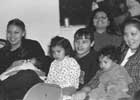
Purpose: To identify the needs of urban American Indian families who care for school-aged children with physical health impairments and their recommendations for improving the quality of care these children receive.
Through their stories, family caregivers from Minneapolis, MN shared their experiences and recommendations for improving care for American Indian children with chronic conditions. After the data were collected, we invited families and community representatives to a thank you feast in the community. At that time, we shared key findings and worked together to develop an action plan.
Based on this input, we focused next on providing culturally appropriate asthma education for children and families in the community and shared families' recommendations for providing culturally appropriate care with health care providers.
Funded by the National Institute on Disability and Rehabilitation Research (NIDRR).
Indian family asthma project
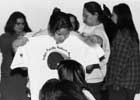
Purpose: To provide culturally relevant asthma information to American Indian families who care for school-aged children through a family-focused, community-based intervention.
The intervention project was based at the Little Earth of United Tribes community center. We partnered with faculty and health care professional students from the University of Minnesota to provide this intervention. Families of children with asthma who participated in Phase I of the project were invited to participate in the Indian Family Asthma Project.
Two types of intervention were offered - a multiple family group intervention and an individual family home visit model. At the end of this project, families indicated the need for the Indian community to be aware of asthma and requested that we develop more culturally appropriate resources
Funded by the Maternal and Child Health Bureau through Project Accord (MCJ-27RO21).
Access to care for American Indian children with special health care needs
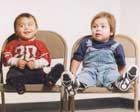
Purpose: To identify access barriers and the needs of rural American Indian families who care for school-aged children with special health care needs.
To better understand the similarities and differences between families' experiences in urban and rural/reservation settings, we carried out a project with families who live on a rural Midwest Ojibwe reservation. We used the same protocol developed in the urban phase of the project with the addition of a more in depth look at barriers to care.
It is interesting to note that families in the rural setting reported fewer cultural barriers to care and were more satisfied with health care services than families in the city where services were more fragmented and difficult to access.
Funded by the Academic Health Center, University of Minnesota Seed Grant.
Enhancing the cultural competence of health care professionals who work with American Indian children and their families
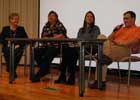
Purpose: To produce and distribute an instructional video and educational materials to increase the cultural awareness of health care providers who work with American Indian children and their families.
In this project, we invited American Indian health care professionals and family representatives to share their wisdom about how to provide more culturally appropriate care. We received funding to distribute 500 award winning Getting to the Heart of It: Bridging Health care and Culture videos and information to health care providers in training and practice settings.
Funded by the Community University Partnership in Education and Services (CUPES) project which receives support from the Kellogg Foundation and the University of Minnesota Academic Health Center
Indian asthma video project
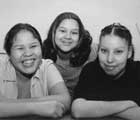
Purpose: To produce an disseminate a culturally-sensitive video about asthma, from the perspective of Indian youth, in order to increase the awareness of asthma in the community.
The Breathing a Word: Indian Stories of Asthma video was developed in partnership with Indian youth and families at Little Earth of United Tribes, Inc. in the Phillips neighborhood in Minneapolis, MN., graduate learners and faculty in the Community University Partnership in Education and Service (CUPES) project, and Allies: Media/Art which is a Dakota-owned media production company. Three Indian youth participated in a 6-week training program where they learned about asthma, videography and story telling.
After the training, the youth videotaped their stories about living with asthma. Film footage from each of the teen's stories was incorporated into the final video which includes a prologue about the need for asthma information identified by the Indian community, stories about living with asthma, and demonstrations of an inhaler and peak flow meter. "Breathing a Word: Indian Family Stories" won a media award from the National Council on Family Relations.
Funded by the Community University Partnership in Education and Services (CUPES) project which receives support from the Kellogg Foundation and the University of Minnesota Academic Health Center.